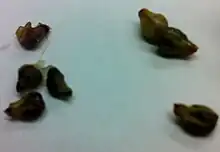חרצן
Hebrew

חַרְצָנׅים (1)

חַרְצָנׅים (2)
| Root |
|---|
| ח־ר־ץ (ḥ-r-ṣ) |
Etymology
To be compared to Arabic حِصْرِم (ḥiṣrim, “sour grapes”). The Hebrew is recognized[1][2][3] as referring in the Bəmiḏbar 6:4 to unripe grapes, and is connected thus to the root ח־ר־ץ / ح ر ص (ḥ-r-ṣ) related to abrasion because of the sour grape being sharp on the tongue; compare Hebrew חָרִיץ (ḥārī́ṣ, “cheese; slit, furrow”).
Noun
חַרְצָן • (ḥarṣā́n) m (plural indefinite חרצנים)
- (Biblical Hebrew) sour grape, vine fruit green and acid due to lacking maturity
- Synonym: בֹּסֶר (boser)
- (Modern Hebrew) pip, seed
References
- “חרצן” in the Hebrew Terms Database of the Academy of Hebrew Language
- Delitzsch, Franz, Keil, Carl Friedrich (1870) Biblischer Commentar über das Alte Testament. Erster Theil: Die Bücher Mose’s. Zweiter Band: Leviticus, Numeri und Deuteronomium (in German), Zweite, verbesserte edition, Leipzig: Dörffling und Franke, page 214
- Vilmar, Eduard (1864) “Die symbolische Bedeutung des Naziräergelübdes”, in Theologische Studien und Kritiken (in German), volume 37, number 3, Gotha: Friedrich Andreas Perthes, pages 468–469 from 438–484
- Homes, Henry (1848) “The Produce of the Wineyard in the East”, in Bibliotheca Sacra and Theological Review, volume 5, New York and London: John Wiley; Andover: William H. Wardwell, pages 286 from 283-295
This article is issued from Wiktionary. The text is licensed under Creative Commons - Attribution - Sharealike. Additional terms may apply for the media files.